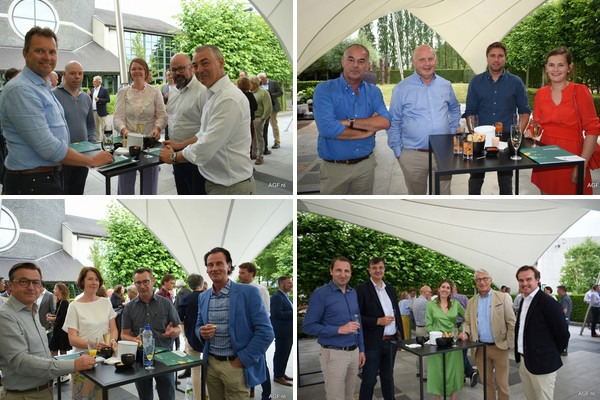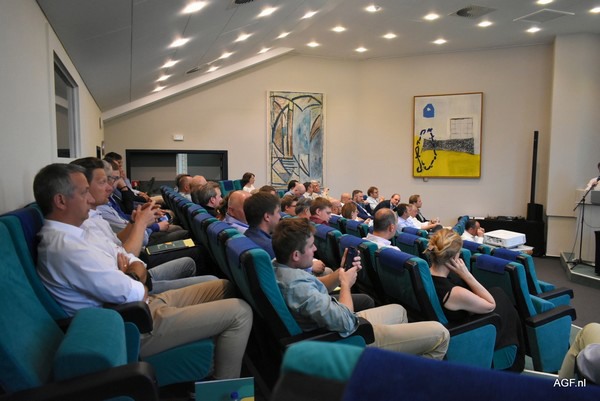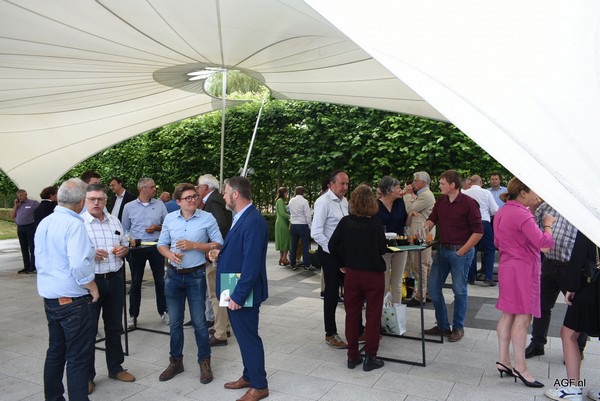Belgian potato, vegetable, and fruit traders and representatives from the processing sector gathered on Tuesday, 27 June, for Fresh Trade Belgium, Belgapom, and Vegebe's annual FVPhouse event. After the general meeting, sustainable food and the agriculture and horticulture of the future were the focus of the day in Affligem, Belgium.

One thing quickly became evident during the event: 'Sustainability will become an ever-important topic in the future.' The panel discussion - from the perspective of cultivation (Bram Van Hecke, Groene Kring), retail (Els Bedert) Eurocommerce), and research (Tessa Avermaete (KU Leuven) - after the general meeting focused on this sector trend. The sustainable food theme was highlighted.
Durability
What exactly falls under sustainable food? Tessa Avermaete of KU Leuven described it as quality food for today and future generations. "We're heading toward ten billion people, all needing to be fed. It's, thus, important that we can guarantee enough healthy food for the years to come," she says. Bram Van Hecke adds the 'in' word: "Sustainability. Ensuring cultivation is done from an agricultural perspective so your sons or daughters can continue the work and the land's not depleted. The entire system must participate."
Els Bedert spoke primarily about collaboration. Many parties often follow their own plan. "We'd love to know what exactly is sustainable food. Everyone's capitalizing on their specialty, but there's no central approach to sustainability. Together, we need clarity on what to focus on. Sustainability is at the top of many minds, but it's a complex issue with numerous aspects."
Does sustainable equal local?
Does small-scale local equate to sustainable? Tessa is not convinced of this. "The rule of thumb is to do what you're good at. We shouldn't grow avocados in Belgium; yet, importing them doesn't necessarily mean they're unsustainable. Stick to what you do and get people eating healthier again." Bram partly agrees. "We shouldn't rely on our apples still being in supermarkets across the globe in a decade or so."
"It's definitely not protectionism, but we should consider European consumers between Amsterdam and Paris. For a sustainable future, that's a responsible scale." Els concurs: "Some consumers seem to have lost touch with growers. It's vital to foster the understanding of where your food comes from."

Consumers have a critical role, say the panelists, though this occasionally needs to be steered. "Shoppers generally still consider prices. They want to spend a little money as quickly as possible when shopping. So, it's up to us to include the general public in the sizeable sustainability challenges. The market sometimes has to steer you a bit in that," explains Bram.
Competitive retail
According to the panelists, sustainability also means higher margins must be realized to keep cultivation attractive to growers. Asked about the future, Bram is passionate about this. "Many ardent growers drop out because it's been made so difficult for them. We're increasingly moving toward large dependent growers and away from small-scale impassioned growers. That's an evolving problem."
A problem Els acknowledges. "However, retail is a very competitive industry, constantly striving for cost-cutting production to trump others." Aren't we then out-competing each other? Should we move to the French model, with its set minimum paid amounts? "Consumers must also be willing to pay that," Tessa points out.
It's a very tricky issue that can be discussed for a long time. That was indeed done after the panel discussion. Bram, however, noted the chain is hugely flawed and needs to be reformed. The others agreed. "But, reform is difficult when money's being made. Those earning and profiting now don't think about change. Then it is their 'business.' But, growers end up footing the bill. I think forward-thinking and cooperation are central to future discussions," he says.
Project in support of due diligence directive
With this in mind, FVPhouse teamed up with Sliding Doors and, thanks to financial support from FIDO, launched a project to help companies implement the new European due diligence directive. This legislation aims to make the supply chain more socially and environmentally sustainable. The project was further explained at the event.
"The legislation isn't limited to imports from distant countries. European or local companies must also work with them. Obligations initially apply to large companies, but this inevitably affects their suppliers, often SMEs. Private sustainability specifications already on the market don't usually cover everything," says Fresh Trade Belgium's Veerle Vandersypt.

"The year-long project began in January and should help fulfill both private standards and legal requirements." The project wants to use workshops to create knowledge-building via a learning network. "Also, about a dozen companies will get the chance to step in as pilot businesses; they can then offer several hours of consultancy," explains Veerle.
"FVPhouse held two risk identification and management workshops and an information session in spring 2023. In fall 2023, another workshop on integration of 'due diligence' into the business processes will follow, and a return day to exchange experiences is planned for November." says Veerle.
The partners want to use this project to show the government the sector's bottlenecks and challenges. "And possibly make recommendations or offer regulatory support," Veerle concludes. So, during the event, sector representatives learned more about the project and went home with plenty of food for thought, but not before the day, of course, ended with real food and drinks.
For more information: FVPhouse
FVPhouse
Tel: +32 (0) 933 91 252
Email: [email protected]
Website: www.fvphouse.be










